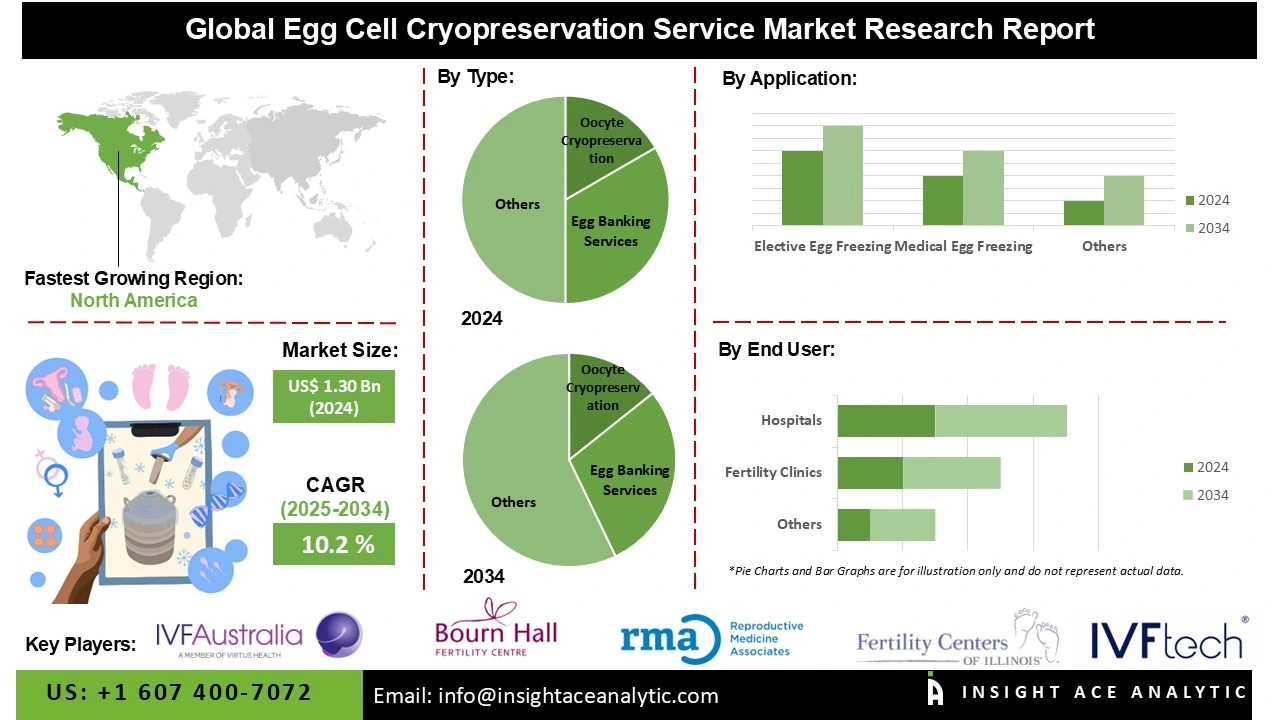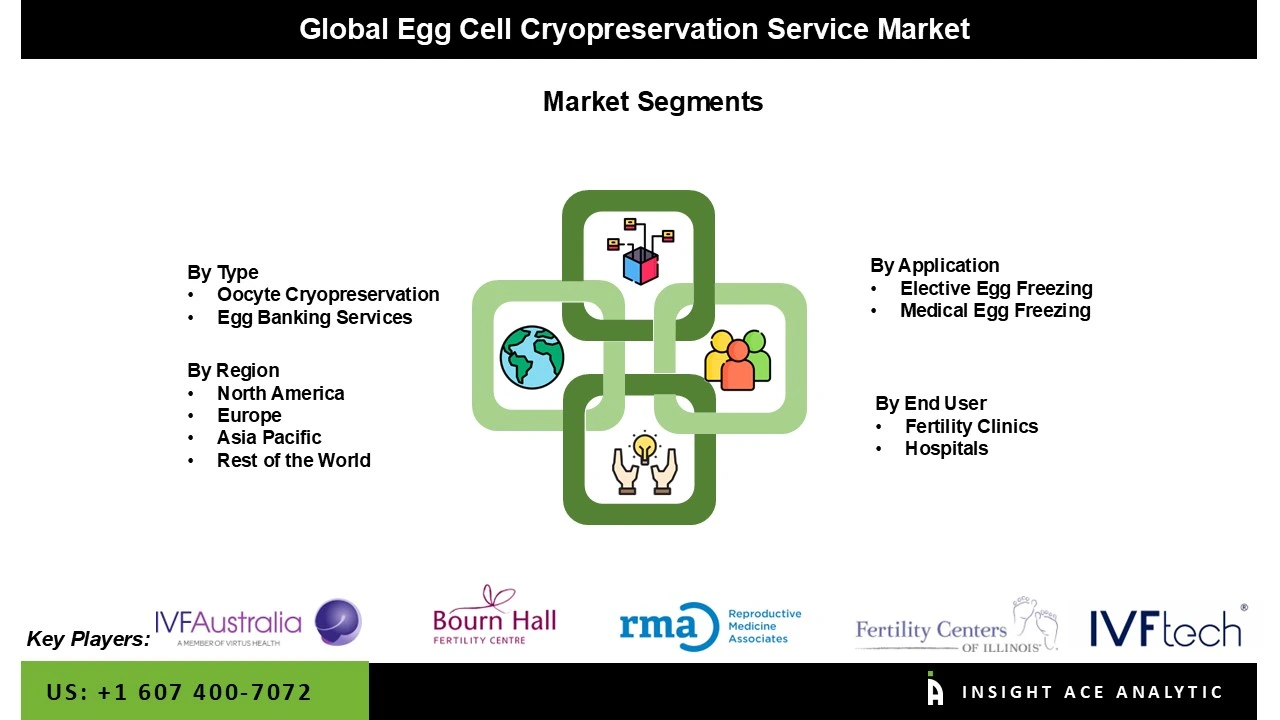Global Egg Cell Cryopreservation Service Market is valued at US$ 1.30 Bn in 2024 and it is expected to reach US$ 3.37 Bn by 2034, with a CAGR of 10.2% during the forecast period of 2025 to 2034.
Egg Cell Cryopreservation Service Market Size, Share & Trends Analysis Distribution by Type (Oocyte Cryopreservation and Egg Banking Services), Application (Medical Egg Freezing and Elective Egg Freezing), End-use (Fertility Clinics and Hospitals), and By Segments Forecasts, 2025 to 2034

Egg cell cryopreservation, commonly known as egg freezing, is a clinical process involving the retrieval, freezing, and storage of a woman’s mature oocytes for future reproductive use. The procedure begins with ovarian stimulation through hormone injections to promote multi-follicular development, followed by a minimally invasive egg retrieval.
The collected eggs are preserved using vitrification—an advanced rapid-freezing technique that prevents ice crystal formation and maintains cellular integrity. When the patient decides to pursue pregnancy, the cryopreserved eggs are thawed, fertilized via intracytoplasmic sperm injection (ICSI), and transferred as embryos into the uterus during an in vitro fertilization (IVF) cycle. The development of vitrification technology marked a critical breakthrough in the field, revolutionizing preservation outcomes by preventing ice crystal formation and achieving post-thaw survival rates exceeding 90%—a significant improvement over earlier slow-freezing methods.
The global egg cryopreservation market is expanding due to rising demand for fertility preservation, supported by technological innovations and greater awareness of reproductive options. Advances in vitrification protocols and automated cryopreservation systems have significantly improved survival and fertilization rates, enhancing service reliability and patient confidence. Additionally, the integration of telemedicine has improved accessibility to fertility specialists, enabling remote consultations and follow-up care. Educational initiatives and public health campaigns focused on reproductive health are further empowering women to make informed decisions regarding fertility preservation. These developments, alongside evolving societal attitudes and expanded insurance coverage in key markets, are expected to drive sustained market growth in the coming years.
Some of the Key Players in Egg Cell Cryopreservation Service Market:
The Egg Cell Cryopreservation Service market is segmented by Type, Application, and End-use. By Type, the market is segmented into Oocyte Cryopreservation and Egg Banking Services. By Application, the market is segmented into Medical Egg Freezing and Elective Egg Freezing. By End-use, the market is segmented into Fertility Clinics and Hospitals.
The Oocyte Cryopreservation category dominated the egg cell cryopreservation service market in 2024. Later-age family planning and the increased infertility risk with maternal age are driving growth in the oocyte cryopreservation category by encouraging more women to bank eggs proactively; increased awareness from OB-GYNs, influencers, and employer fertility benefits is expanding the addressable pool. Additionally, clinical innovations, including vitrification, closed-system freezing, enhanced cryoprotectants, and standardized lab quality assurance, have increased live birth and survival rates, lowering perceived risk and increasing acceptance. Egg freezing prior to gonadotoxic treatments is becoming more common in oncofertility programs, and demand from LGBTQ+ people and single parents by choice adds new user groups.
The medical egg freezing category is growing because of the increasing need for oncofertility, which is driving standard referral pathways from oncologists to fertility clinics, as more women of reproductive age undergo gonadotoxic treatments for autoimmune disorders, cancer, sickle-cell and thalassemia conditioning, and gender-affirming care. Additionally, clinical advancements —specifically fast-freeze vitrification, improved stimulation techniques for poor responders, and improved screening (AMH/Antral Follicle Count) that improve time to retrieval —have increased oocyte survival and live birth rates, increasing patient uptake and clinician trust. Moreover, the availability of payment plans, government or philanthropic support for young cancer patients, and progressive advances in reimbursement and employer/insurer coverage for medical indications further make operations more accessible.
The North American egg cell cryopreservation service market held the largest share in 2024 because of the widespread use of assisted reproductive technology and the growing acceptance of the fertility preservation message. The field is in great demand since many women choose to delay becoming pregnant for reasons linked to their personal, professional, or health. Additionally, the growth is being driven by improvements in freezing technology, advantageous insurance contracts, and high-level access to prestigious fertility facilities. Social support, continued progress in reproductive medicine, and a positive outlook on preserving fertility have all been essential. Moreover, due to rising awareness efforts and regulatory laws, these services are becoming more accessible.
Throughout the projected period, the Asia Pacific region is anticipated to develop at the fastest rate in the egg cell cryopreservation service market. The expanding population is a major driver of market growth, and changing lifestyle choices are leading to health problems. People are becoming more likely to become pregnant and give birth later in life due to a variety of factors, including inflation, high living expenses, job security, and growing economic burdens.
Egg Cell Cryopreservation Service Market by Type-
· Oocyte Cryopreservation
· Egg Banking Services

Egg Cell Cryopreservation Service Market by Application -
· Medical Egg Freezing
· Elective Egg Freezing
Egg Cell Cryopreservation Service Market by End-use-
· Fertility Clinics
· Hospitals
Egg Cell Cryopreservation Service Market by Region-
North America-
· The US
· Canada
Europe-
· Germany
· The UK
· France
· Italy
· Spain
· Rest of Europe
Asia-Pacific-
· China
· Japan
· India
· South Korea
· Southeast Asia
· Rest of Asia Pacific
Latin America-
· Brazil
· Argentina
· Mexico
· Rest of Latin America
Middle East & Africa-
· GCC Countries
· South Africa
· Rest of the Middle East and Africa
Chapter 1. Methodology and Scope
1.1. Research Methodology
1.2. Research Scope & Assumptions
Chapter 2. Executive Summary
Chapter 3. Global Egg Cell Cryopreservation Service Market Snapshot
Chapter 4. Global Egg Cell Cryopreservation Service Market Variables, Trends & Scope
4.1. Market Segmentation & Scope
4.2. Drivers
4.3. Challenges
4.4. Trends
4.5. Investment and Funding Analysis
4.6. Porter's Five Forces Analysis
4.7. Incremental Opportunity Analysis (US$ MN), 2025-2034
4.8. Competitive Landscape & Market Share Analysis, By Key Player (2024)
4.9. Use/impact of AI on Egg Cell Cryopreservation Service Market Industry Trends
4.10. Global Egg Cell Cryopreservation Service Market Penetration & Growth Prospect Mapping (US$ Mn), 2024-2034
Chapter 5. Egg Cell Cryopreservation Service Market Segmentation 1: By Type, Estimates & Trend Analysis
5.1. Market Share by Type, 2024 & 2034
5.2. Market Size Revenue (US$ Million) & Forecasts and Trend Analyses, 2021 to 2034 for the following Type:
5.2.1. Oocyte Cryopreservation
5.2.2. Egg Banking Services
Chapter 6. Egg Cell Cryopreservation Service Market Segmentation 2: By Application, Estimates & Trend Analysis
6.1. Market Share by Application, 2024 & 2034
6.2. Market Size Revenue (US$ Million) & Forecasts and Trend Analyses, 2021 to 2034 for the following Application:
6.2.1. Elective Egg Freezing
6.2.2. Medical Egg Freezing
Chapter 7. Egg Cell Cryopreservation Service Market Segmentation 3: By End User, Estimates & Trend Analysis
7.1. Market Share by End User, 2024 & 2034
7.2. Market Size Revenue (US$ Million) & Forecasts and Trend Analyses, 2021 to 2034 for the following End User:
7.2.1. Fertility Clinics
7.2.2. Hospitals
Chapter 8. Egg Cell Cryopreservation Service Market Segmentation 4: Regional Estimates & Trend Analysis
8.1. Global Egg Cell Cryopreservation Service Market, Regional Snapshot 2024 & 2034
8.2. North America
8.2.1. North America Egg Cell Cryopreservation Service Market Revenue (US$ Million) Estimates and Forecasts by Country, 2021-2034
8.2.1.1. US
8.2.1.2. Canada
8.2.2. North America Egg Cell Cryopreservation Service Market Revenue (US$ Million) Estimates and Forecasts by Type, 2021-2034
8.2.3. North America High-Altitude Oxygen Simulation Market Revenue (US$ Million) Estimates and Forecasts by Application, 2021-2034
8.2.4. North America Egg Cell Cryopreservation Service Market Revenue (US$ Million) Estimates and Forecasts by End User, 2021-2034
8.3. Europe
8.3.1. Europe Egg Cell Cryopreservation Service Market Revenue (US$ Million) Estimates and Forecasts by Country, 2021-2034
8.3.1.1. Germany
8.3.1.2. U.K.
8.3.1.3. France
8.3.1.4. Italy
8.3.1.5. Spain
8.3.1.6. Rest of Europe
8.3.2. Europe Egg Cell Cryopreservation Service Market Revenue (US$ Million) Estimates and Forecasts by Type, 2021-2034
8.3.3. Europe Egg Cell Cryopreservation Service Market Revenue (US$ Million) Estimates and Forecasts by Application, 2021-2034
8.3.4. Europe Egg Cell Cryopreservation Service Market Revenue (US$ Million) Estimates and Forecasts by End User, 2021-2034
8.4. Asia Pacific
8.4.1. Asia Pacific Egg Cell Cryopreservation Service Market Revenue (US$ Million) Estimates and Forecasts by Country, 2021-2034
8.4.1.1. India
8.4.1.2. China
8.4.1.3. Japan
8.4.1.4. Australia
8.4.1.5. South Korea
8.4.1.6. Hong Kong
8.4.1.7. Southeast Asia
8.4.1.8. Rest of Asia Pacific
8.4.2. Asia Pacific Egg Cell Cryopreservation Service Market Revenue (US$ Million) Estimates and Forecasts by Type, 2021-2034
8.4.3. Asia Pacific Egg Cell Cryopreservation Service Market Revenue (US$ Million) Estimates and Forecasts by Application, 2021-2034
8.4.4. Asia Pacific Egg Cell Cryopreservation Service Market Revenue (US$ Million) Estimates and Forecasts by End User, 2021-2034
8.5. Latin America
8.5.1. Latin America Egg Cell Cryopreservation Service Market Revenue (US$ Million) Estimates and Forecasts by Country, 2021-2034
8.5.1.1. Brazil
8.5.1.2. Mexico
8.5.1.3. Rest of Latin America
8.5.2. Latin America Egg Cell Cryopreservation Service Market Revenue (US$ Million) Estimates and Forecasts by Type, 2021-2034
8.5.3. Latin America Egg Cell Cryopreservation Service Market Revenue (US$ Million) Estimates and Forecasts by Application, 2021-2034
8.5.4. Latin America Egg Cell Cryopreservation Service Market Revenue (US$ Million) Estimates and Forecasts by End User, 2021-2034
8.6. Middle East & Africa
8.6.1. Middle East & Africa Wind Turbine Rotor Blade Market Revenue (US$ Million) Estimates and Forecasts by country, 2021-2034
8.6.1.1. GCC Countries
8.6.1.2. Israel
8.6.1.3. South Africa
8.6.1.4. Rest of Middle East and Africa
8.6.2. Middle East & Africa Egg Cell Cryopreservation Service Market Revenue (US$ Million) Estimates and Forecasts by Type, 2021-2034
8.6.3. Middle East & Africa Egg Cell Cryopreservation Service Market Revenue (US$ Million) Estimates and Forecasts by Application, 2021-2034
8.6.4. Middle East & Africa Egg Cell Cryopreservation Service Market Revenue (US$ Million) Estimates and Forecasts by End User, 2021-2034
Chapter 9. Competitive Landscape
9.1. Major Mergers and Acquisitions/Strategic Alliances
9.2. Company Profiles
9.2.1. CooperSurgical (USA)
9.2.1.1. Business Overview
9.2.1.2. Key Product /Service Overview
9.2.1.3. Financial Performance
9.2.1.4. Geographical Presence
9.2.1.5. Recent Developments with Business Strategy
9.2.2. IVF Technologies (USA)
9.2.3. Fertility Centers of Illinois (USA)
9.2.4. CryoBank (USA)
9.2.5. Reproductive Medicine Associates of New Jersey (USA)
9.2.6. CCRM Fertility (USA)
9.2.7. OvaScience (USA)
9.2.8. New Hope Fertility Center (USA)
9.2.9. Genea (Australia)
9.2.10. Bourn Hall Clinic (UK)
9.2.11. Fertility First (Australia)
9.2.12. IVF Australia (Australia)
9.2.13. Clinica Santa Maria (Chile)
9.2.14. The Fertility Institute (USA)
9.2.15. Bristol Hospital Fertility Center (USA) az